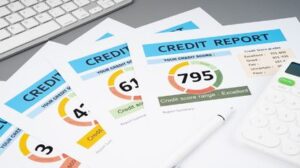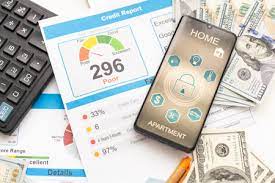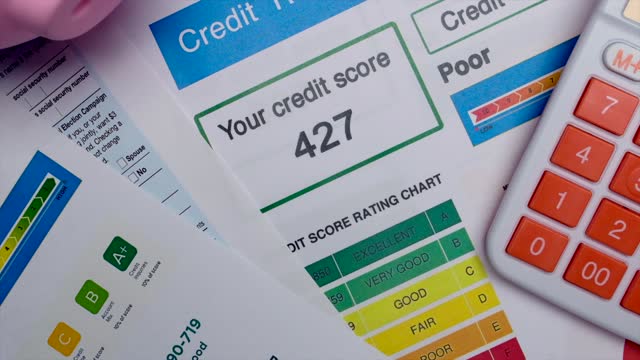Taking care of your credit score is one of the ways that you can be financially savvy. However, there are times when maintaining a good credit score is difficult, if not impossible, and you end up with a bad credit score no matter how much you try to avoid it. For many people, getting a bad credit score can often feel like a drawn-out but inevitable process.
If you’re not careful, you could find yourself in this situation without ever realizing it. For example, if you habitually pay your bills after the due date or use your credit card for purchases without having a payment plan in place, these small but poor financial decisions add up over time to adversely affect your credit score.
What is a Credit Score?

A credit score is a three-digital number that ranges from 300 to 850 and is determined from various aspects of your financial history. Typically, credit scores come from three companies, namely TransUnion, Experian, and Equifax. Your credit score is also referred to as your FICO (Fair Isaac Cooperation) score.
To determine your credit score, these companies analyze several factors such as:
- Your payment history (35%)
- Accounts owed/liabilities (30%)
- Your credit history’s length (15%)
- Frequency of opening new credit lines (10%)
- Credit history such as existing credit cards, long-term loans in your name, etc. (10%)
If you don’t know your credit score, there are some ways you can get it. If you own at least one bank account that has been open for longer than six months, if you have a credit card in your name, or if you have been paying utility bills in your name, you can reach out to either FICO or VantageScore to get your current credit score generated.
However, if you don’t have any of those things yet, you’ll need to build your credit history to qualify for a credit score. One of the easiest ways to build your credit score from scratch is by applying for a secured credit card.
A secured credit card is a credit account that is backed by a cash deposit that you make upfront when you open the account with the bank. Most banks require a minimum deposit of $200 to issue a secured credit card, although some companies such as Avant and Deserve do offer alternative credit cards that don’t require a security deposit. To qualify for an alternative credit card, however, you must be a resident of the United States with a valid Social Security Number or an Individual Taxpayer Identification Number.
Aside from getting a secured credit card, you can also use services from credit-building companies such as Kikoff, IdentityIQ, or Self. Using credit-building programs allows you to build your credit rate from scratch at your own pace or even bump up your existing credit scores!
Contrary to what many people believe, a person’s salary, occupation, employer, or employment history are not taken into account in the calculation of a credit score. However, this information may still be considered alongside a person’s credit score when companies evaluate applications for loans, home rentals, etc.
What Constitutes a Bad Credit Score?

As mentioned above, your credit score will fall anywhere from 300 to 850. Here is what those numbers will mean for you:
- Poor (Less than 580) – Anything below 580 means that you will be seen as a risk by money lenders, utility providers, and other companies. It will be supremely difficult for you to avail of any services and you should improve your credit score first.
- Fair (580 – 669) – This score puts you just slightly below the national average. While people with a fair rating are seen as less likely to default on loans, many lenders offset the risk by imposing higher interest rates or opening smaller lines of credit.
- Good (670 – 739) – According to data from FICO, around 67% of Americans have a “good” credit score rating and this is generally the minimum accepted score for most loans.
- Excellent (740 – 799) – An excellent rating on your credit score means that lenders will see you as dependable and highly likely to repay your debts on time.
- Exceptional (More than 800) – This rating is well above the national average and will likely be approved by any financial institution.
Five Ways a Bad Credit Score Can Adversely Affect You

1. Trouble Getting Loans from Credible Lenders
If you have a bad credit score, you’re probably more than familiar with getting denied when applying for a loan with major banks such as Bank of America, Citi, and Discover. These banks have strict criteria for those who can qualify for any kind of loan, and having a bad credit score usually disqualifies you from being eligible.
Being unable to get a loan from a reputable bank can drive you to seek out less-than-reputable sources such as pawn shops, title loans, and payday loans, but you should thoroughly read the fine print! Payday loans, for example, are a fast and easy way to get cash if you’re in a pinch but they usually come with usurious interest rates. Some payday loans can even charge an APR that’s as high as 400% to 700%, and the full amount is payable in a month.
If you’re having trouble understanding that scenario, think of it this way: imagine borrowing $100 from a payday loan lender with an APR of 400%. After a month, you’ll need to return not only that $100, but also an additional $400 on top of your principal amount. You repaid your loan five times over. Talk about insane interest rates!
2. Fewer and Lower Quality Options for Renting or Buying a House
If you’re in the market to rent or buy a house, maybe hold off on that if you have a bad credit rating. Anything below an average score usually means you’ll have limited options either for renting or for home financing.
While it’s still possible to rent an apartment with a bad credit score, your landlord may require additional assurances such as a bigger security deposit, upfront payment of multiple months’ rent, or securing a guarantor or cosigner on your lease.
On the other hand, having at least an average credit score can mean that you’re eligible for better mortgage rates if you plan to purchase a home. A FICO score of at least 620 can allow you to qualify for around 5% in interest with current rates. However, if you have a score of good or better, you might be able to borrow at roughly 3% APR.
While a 1.6% difference in rates might sound small, that difference can add up significantly over time! A lower credit score saves you around $275 per month, which amounts to $99,000 over a 30-year term.
3. Higher Insurance Rates
Your credit score rating can have a huge impact on your insurance rates, particularly when it comes to your car insurance premiums. This is because insurers use credit-based insurance scores to set a particular driver’s rates on the idea that “credit information is very predictive of future accidents or insurance claims.”
While a dip in your credit score does not automatically increase your premium, there is a good chance that your premiums will increase once you get your policy renewed. On average, drivers with credit scores under the 620 threshold pay approximately $2,887 for car insurance while drivers with exceptional credit scores pay around $1,350 annually – even if both drivers have a similar driving record.
The same goes for health insurance policies. Lenders will typically look at individuals with bad credit scores as a higher risk so they may charge more expensive premiums to offset the risk.
4. Deposits May be Required for Utilities
Having a bad credit score means you’ll also encounter problems when trying to create an account with utility providers, internet companies, or even cellphone companies. You may be asked to provide a deposit before they create your account, which the companies will use as insurance in case you fail to pay your monthly bill.
When getting a cellphone, you could also be asked to place a deposit or you might be limited to a prepaid plan.
5. Job Interviews Can be Harder
In a 2016 CareerBuilder Survey, 72% of employers revealed that they run a background check on every new hire. Of those, around 30% cover the hire’s credit score as part of the evaluation process. This practice is common for management positions or jobs that require the candidate to handle a company’s finances.
It’s not hard to understand the logic behind it! Companies want to ensure that the person handling their money can be trusted when making financial decisions, and it’s hard to hand over your company’s financial data to someone with (presumably) a history of making bad financial choices.
Can You Improve a Bad Credit Score?

Luckily, having a bad credit score isn’t a permanent situation and you can improve your credit score by making changes to how you handle your money. Since the biggest chunk of calculating your credit score comes from your payment history (remember, it accounts for 35% of a FICO score), paying your bills on time will improve your score. You can also improve your score by maintaining a low credit utilization ratio. Simply put, a credit utilization ratio refers to how much revolving debt you have against the amount of credit available to you. If you want a low credit utilization ratio, the easiest way is to use cash and pay in full when paying off bills or making purchases.
Final Thoughts
While most people associate having bad credit scores with being unable to get loans or apply for a good mortgage rate, the consequences can reach further than you imagined! Not only will a bad credit report leave you unable to get low insurance premiums and illegible for car or home loans, but it can also make it harder for you to apply for a job or even get that new phone you’ve been eyeing.
If you don’t know where to stand when it comes to your credit score, now is a good time to know! Contact CleanCreditClinic today for a FREE credit consultation.
